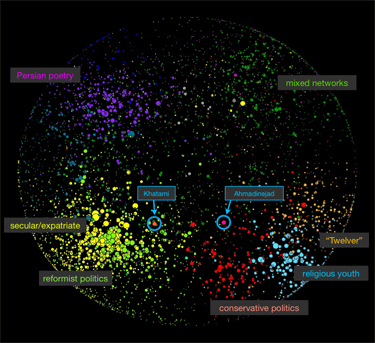A new study by the Berkman Center for Internet and Society opens with the following narrative:
Iran, a country rich in history, culture, and education, supports a large online community, including perhaps the fourth largest ‘blogosphere’ in the world (or the second, third or seventh). Because the Iranian press is under the control of religious conservatives who sit above elected officials in Iran’s peculiar hybrid political system, and because that conservative control is used to silence dissent, Iranians who think differently go online to express their views. Here, the inherent freedom of the Internet (anonymity, decentralized control, etc.) allows the true minds of Iran’s youth, journalists, and intellectuals to be known publicly. In their blogs and online chats we see their rejection of the regime, its brutal paternalistic control, its enforcement of archaic sexual mores, its corruption and incompetence, and of the legitimacy of the Islamic Republic itself. The government, worried, has cracked down. Bloggers have been sent to jail, websites are being blocked, and user bandwidth is constricted, but the Internet continues to be one of the best hopes for homegrown democratic change in autocratic Iran. If you read Iranian blogs, it is clear that many Iranians want drastic social and political change.
The authors of the paper then do the homework to ask if this story is true. And it is true– but so is a story about social and religious conservatives using the internet, or a story about the many sites devoted to Persian poetry and literature. Part of the confusion here is that we have, in the West, our own story about what it means to be liberal, freedom-loving, democratic, as contrasted with closed, repressive, backwards. Our ideas about the social and political struggles of Iranians do not map neatly to reality.
Continue reading Iranian Bloggers Fail to Live up to Stereotypes
